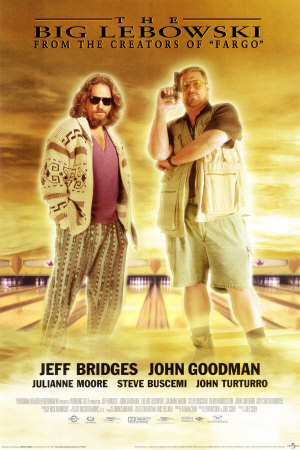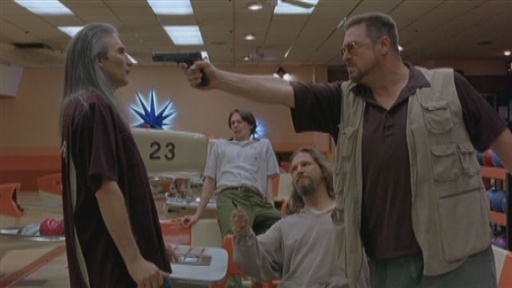

Director: Joel Coen, 1998.
The Big Lebowski, despite no American awards, is one of the signature films from the Coen brothers. (Ethan was uncredited as director.) As in many of their other movies, they consistently use their favorite actors (John Goodman, Steve Buscemi, John Turturro) and they focus on idiots and losers. They had Brad Pitt as the moron in Burn After Reading, Nicolas Cage in Raising Arizona, here Jeff Bridges plays Jeffrey Lebowski, the laziest slacker in Los Angeles.
Lebowski is a bowler and a bum. Known as "The Dude" he epitomizes the concept of slacking. When his apartment door is busted down by two thugs, one a Chinaman, he has no idea of what is going on. They want the money his wife owes. But the Dude is not married. This is a case of mistaken identity. The Dude is not the Big Lebowski (David Huddleston), the millionare, wheelchair-bound, overachiever who is his namesake. In contrast, the Dude is a laid-back man who can take the punishment they dish out. That is, until the Asian pees on his rug before leaving. For the Dude, "That rug really tied the room together."
 This simple case of mistaken identity becomes blown out of proportion as the Dude seeks retribution. He visits the Big Lebowski, being ushered into his presence by his obsequious assistant Brandt (Philip Seymour Hoffman). Leaving, the Dude takes one of the rugs from the mansion as recompense. Later, when the Big Lebowski's trophy wife Bunny gets kidnapped, he turns to the Dude to be the ransom delivery man. For this short delivery he will be paid handsomely. When he brings his bowling buddy Walter (John Goodman), a Vietnam vet converted to Judaism, things go very wrong very quickly.
This simple case of mistaken identity becomes blown out of proportion as the Dude seeks retribution. He visits the Big Lebowski, being ushered into his presence by his obsequious assistant Brandt (Philip Seymour Hoffman). Leaving, the Dude takes one of the rugs from the mansion as recompense. Later, when the Big Lebowski's trophy wife Bunny gets kidnapped, he turns to the Dude to be the ransom delivery man. For this short delivery he will be paid handsomely. When he brings his bowling buddy Walter (John Goodman), a Vietnam vet converted to Judaism, things go very wrong very quickly. The Coens throw in some crazy characters, including Maude Lebowski (Julianne Moore), daughter of the big Lebowski, a feminist artist; a porn tycoon who employs Bunny; and a trio of Nihilist Germans. As their paths cross, there are some very funny moments.
The Coens throw in some crazy characters, including Maude Lebowski (Julianne Moore), daughter of the big Lebowski, a feminist artist; a porn tycoon who employs Bunny; and a trio of Nihilist Germans. As their paths cross, there are some very funny moments.Perhaps the funniest scene is Walter's interrogation of a 15 year-old for stealing the Dude's beater of a car. Realizing he won't get a confession from this sullen teen, he takes a golf club to "his" new Corvette. Only it isn't the boy's car. Add a couple of druggy dream sequences and this film becomes a classic, almost a spoof of the Philip Marlow film noir movies.
But amidst the mayhem and madness, there are some serious issues being raised. In one scene where the two Lebowskis are facing each other around the fire, the Big Lebowski asks the Dude, "What makes a man, Mr. Lebowski? . . . Is it being prepared to do the right thing whatever the cost? Isn't that what makes a man?" Of course, he is not talking literally about maleness. He is metaphorically addressing heroes. A real man, a hero, takes the moral high ground and does the right thing. He is willing to pay the price, whether he wins or loses, because he knows what he has to do. Most Hollywood movies feature such a hero.
But in this movie, the closest thing to a bona fide hero is Walter. As a Vietnam veteran, he has faced the enemy and returned alive. Yet he is a man filled with unresolved anger. For him, life is black and white. It is all about clear demarcation lines.
 Walter says to the Dude while bowling, early in the film, "The chinaman is not the issue here, Dude. I'm talking about drawing a line in the sand, Dude. Across this line, you DO NOT . . . " For Walter, crossing the line is an issue. This is even illustrated in one of their league matches. When a competitor crosses the foul line while bowling, the Dude says, "Walter, ya know, it's Smokey, so his toe slipped over the line a little, big deal. It's just a game, man." But this is not so for Walter: "Dude, this is a league game, this determines who enters the next round robin. Am I wrong? Am I wrong?" Being right is an issue for Walter. He sees life in binary terms. When he is right, everyone else is wrong. It allows him to deal with life more easily, but it is a false dichotomy. Life is multifaceted.
Walter says to the Dude while bowling, early in the film, "The chinaman is not the issue here, Dude. I'm talking about drawing a line in the sand, Dude. Across this line, you DO NOT . . . " For Walter, crossing the line is an issue. This is even illustrated in one of their league matches. When a competitor crosses the foul line while bowling, the Dude says, "Walter, ya know, it's Smokey, so his toe slipped over the line a little, big deal. It's just a game, man." But this is not so for Walter: "Dude, this is a league game, this determines who enters the next round robin. Am I wrong? Am I wrong?" Being right is an issue for Walter. He sees life in binary terms. When he is right, everyone else is wrong. It allows him to deal with life more easily, but it is a false dichotomy. Life is multifaceted.Too often we consider ourselves right and others wrong. In so doing we are not prepared to look at things from another's perspective. But if we take this stance, we are likely to miss out on relating to others. Right and wrong in this sense causes division and distancing rather than engaging. We will lose friends, and resort to inappropriate action. We may not pull a loaded gun to make Smokey report a zero on his scorecard, but we will nevertheless lose out. We may win the battle but lose the war. In fact, at the end of the movie Walter and the Dude lose their other bowling friend Donny (Steve Buscemi) because of Walter's anger issues.
If Walter is the "brains" who comes up with some crazy schemes that are "right" as a way to keep the money that he figures they deserve, the Dude is just the opposite. As a loser living out his life in his boxers and bathrobe, he just wants to bowl with his buddies, drink his White Russian cocktails, and do the odd joint or two. He has no aspirations to be a hero. But even a lazy slacker can be pushed to a limit. Even for a loser there is a line that cannot be crossed. And when this pain point arrives, he will emerge from his sloth and rise up to take action.
The Bible gives warnings to the lazy person, especially in the book of Proverbs. Sloth leads to poverty and often disgrace (Prov. 6:6-11). The sluggard does not get his desires met (Prov.13:4). Clearly being lazy is ethically wrong. God's initial command to mankind was: "Be fruitful and increase in number; fill the earth and subdue it." (Gen. 1:28) This is a cultural mandate to work, not to live life as a lazy bum.
Perhaps the most important theme is that of the rug tying it all together. The Dude could live without most things but not his rug. The rug made it all hang; without the rug the room did not make sense. How does the metaphor of the rug work for us? What is it that ties our lives together? What is it that we cannot lose without taking action? For some, this might be our home? For others, it might be the retirement portfolios? For yet others, it could be the techno toys or the trophies. But, for followers of Jesus, this ought to be Jesus himself. Jesus ties our lives together. He is the one who makes sense of the life we enjoy. He is the one we must be passionate about first and foremost.
Copyright ©2009, Martin Baggs

No comments:
Post a Comment